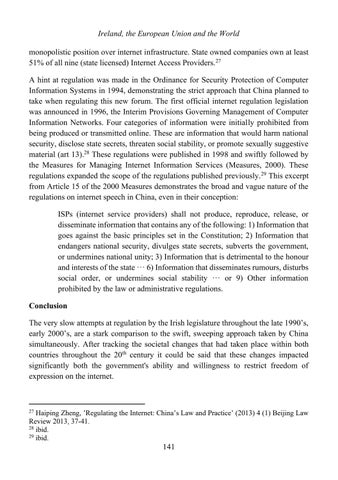Ireland, the European Union and the World monopolistic position over internet infrastructure. State owned companies own at least 51% of all nine (state licensed) Internet Access Providers. 27 A hint at regulation was made in the Ordinance for Security Protection of Computer Information Systems in 1994, demonstrating the strict approach that China planned to take when regulating this new forum. The first official internet regulation legislation was announced in 1996, the Interim Provisions Governing Management of Computer Information Networks. Four categories of information were initially prohibited from being produced or transmitted online. These are information that would harm national security, disclose state secrets, threaten social stability, or promote sexually suggestive material (art 13).28 These regulations were published in 1998 and swiftly followed by the Measures for Managing Internet Information Services (Measures, 2000). These regulations expanded the scope of the regulations published previously. 29 This excerpt from Article 15 of the 2000 Measures demonstrates the broad and vague nature of the regulations on internet speech in China, even in their conception: ISPs (internet service providers) shall not produce, reproduce, release, or disseminate information that contains any of the following: 1) Information that goes against the basic principles set in the Constitution; 2) Information that endangers national security, divulges state secrets, subverts the government, or undermines national unity; 3) Information that is detrimental to the honour and interests of the state ··· 6) Information that disseminates rumours, disturbs social order, or undermines social stability ··· or 9) Other information prohibited by the law or administrative regulations. Conclusion The very slow attempts at regulation by the Irish legislature throughout the late 1990’s, early 2000’s, are a stark comparison to the swift, sweeping approach taken by China simultaneously. After tracking the societal changes that had taken place within both countries throughout the 20th century it could be said that these changes impacted significantly both the government's ability and willingness to restrict freedom of expression on the internet.
Haiping Zheng, ’Regulating the Internet: China’s Law and Practice’ (2013) 4 (1) Beijing Law Review 2013, 37-41. 28 ibid. 29 ibid. 27
141

